#a brief history of time
Photo

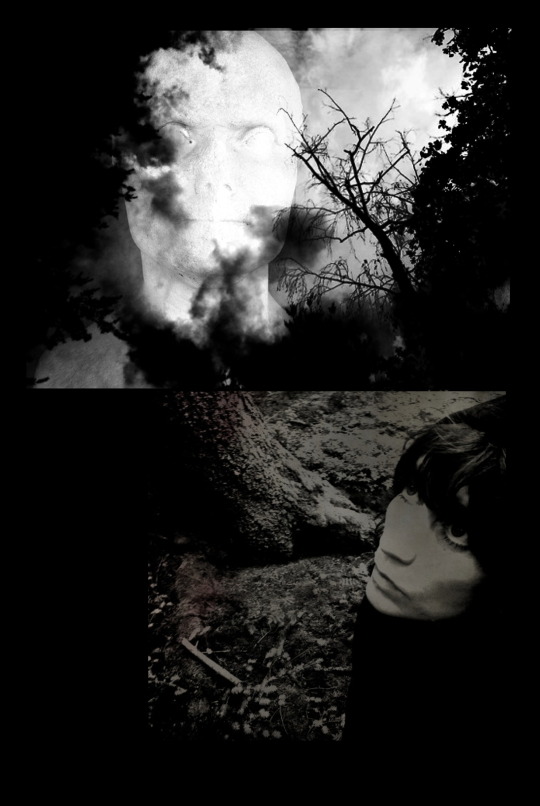
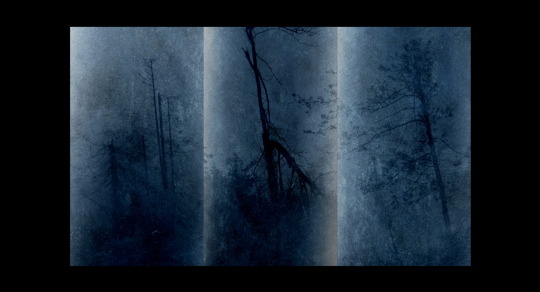
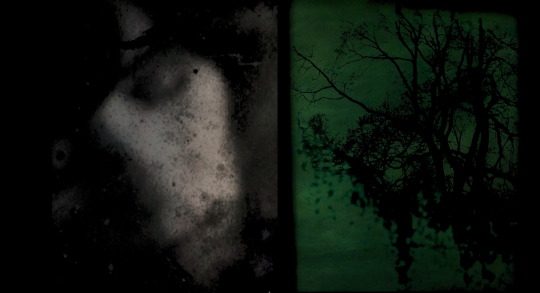

A brief history of Time - series IV
(June photographs of 2019-2022)
222 notes
·
View notes
Photo


A Brief History of Time by Stephen Hawking
Donnie Darko
20 notes
·
View notes
Text

JOMP Book Photo Challenge || July 9 || Handwriting:
I only really annotate nonfiction reads, mostly the science ones.
#a brief history of time#stephen hawking#justonemorepage#jompbpc#book photo challenge#book photography#books#Not Out of Void But Out of Chaos#bpc catch up
18 notes
·
View notes
Text
"Ever since the dawn of civilization, people have not been content to see events as unconnected and inexplicable. They have craved an understanding of the underlying order in the world. Today, we still yearn to know why we are here and where we came from. Humanity's deepest desire for knowledge is justification enough for our continuing quest. And our goal is nothing less than a complete description of the universe we live in."
-A Brief History of Time
Stephen Hawking
33 notes
·
View notes
Text

This shit absolutely fucks with the mind
It's sickeningly fuckin AWESOME!
3 notes
·
View notes
Text
Why does the universe go to all the bother of existing?
Stephen Hawking, from A Brief History of Time, April 1st 1988
#stephen hawking#a brief history of time#existence#literary text#books and libraries#quotes#world literature#science#dark acadamia aesthetic#existential thoughts
28 notes
·
View notes
Text
Stephen Hawking saying that having the universe model of having the world be on the back of a tortoise is not scientifically sound made me go like Terry Pratchett??? I don’t even know if he was consciously referencing it but I saw Discworld immediately lol
6 notes
·
View notes
Photo
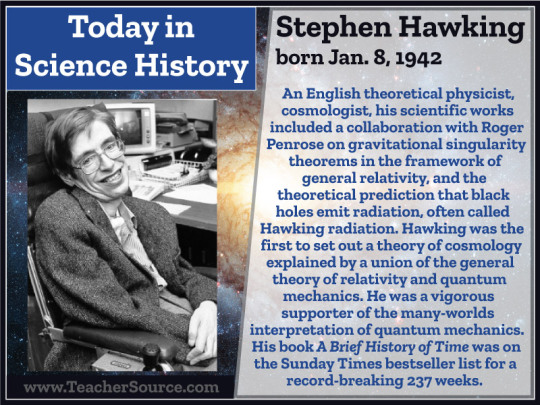
Stephen Hawking was born on January 8, 1942. An English theoretical physicist, cosmologist, his scientific works included a collaboration with Roger Penrose on gravitational singularity theorems in the framework of general relativity, and the theoretical prediction that black holes emit radiation, often called Hawking radiation. Hawking was the first to set out a theory of cosmology explained by a union of the general theory of relativity and quantum mechanics. He was a vigorous supporter of the many-worlds interpretation of quantum mechanics. His book A Brief History of Time was on the Sunday Times bestseller list for a record-breaking 237 weeks.
#stephen hawking#physics#quantum mechanics#quantum physics#hawking radiation#a brief history of time#science#science birthdays#science history#on this day#on this day in science history
5 notes
·
View notes
Photo



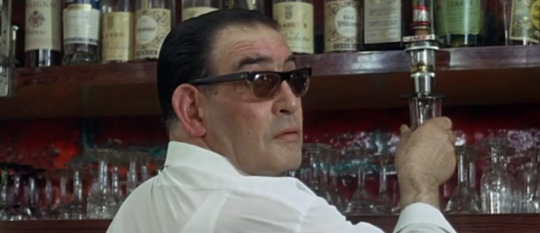


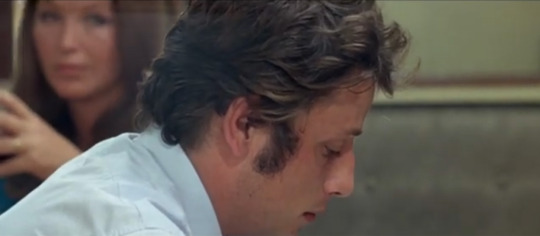
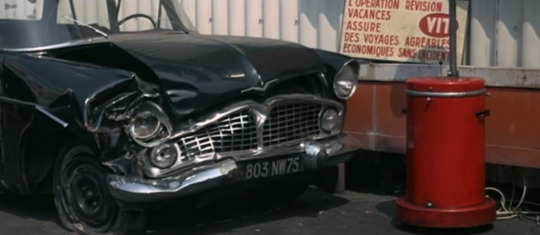
#2 ou 3 choses que je sais d'elle#jean-luc godard#1967#un homme qui dort#a brief history of time#from the big bang to black holes#stephen w. hawking#1988#die physiker#friedrich dürrenmatt#1962#green day#king lear#die höhle der vergessenen träume
7 notes
·
View notes
Quote
“طالما أن الكون له بداية سيكون في استطاعتنا افتراض أن له خالقًا. أما إذا كان الكون حقا مكتملا في حد ذاته، وليس له حد ولا حرف، فلن تكون له بداية ولا نهاية: فهو ببساطة موجود.”
ستيفن هوكنج، تاريخ موجز للزمن
#stephen hawking#a brief history of time#ستيفن هوكنج#تاريخ موجز للزمن#الخالق#الكون#الوجود#بداية الكون#اقتباس#اقتباسات#اقتباسات علمية#علم
6 notes
·
View notes
Photo

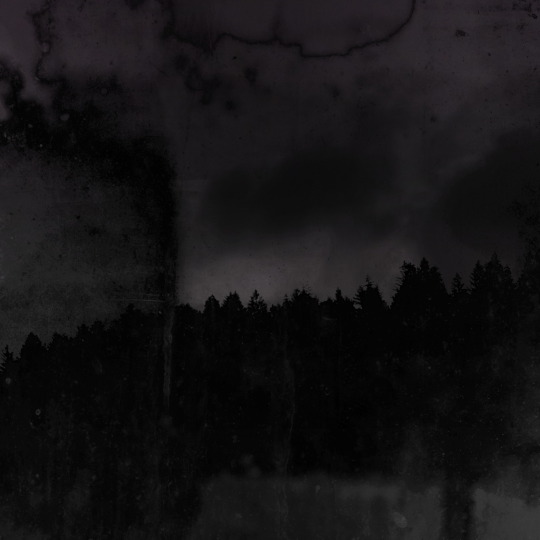


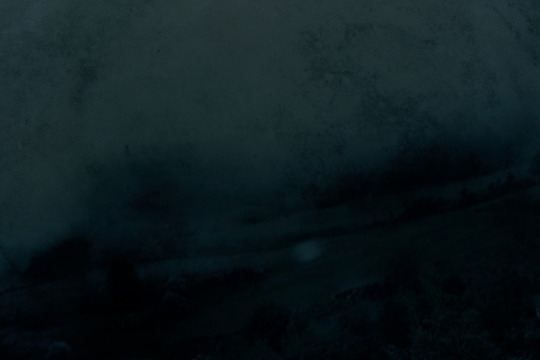

A brief history of Time (series III)
(photographs from May 2019 to 2022)
196 notes
·
View notes
Photo

A Brief History of Time by Stephen Hawking
3rd Rock from the Sun: "Post-Nasal Dick"
9 notes
·
View notes
Text
reblogged from the original
I've just seen A Brief History of Time, and -- just to clarify -- the first time I read the book, in college, I had a very different reaction to it (which makes the new movie much less interesting to me).
First, I was fascinated by the style of the book, and I wanted to "get" what it was saying about art. (It is sort of reminiscent of Infinite Jest: "very funny but very long-winded, too clever for its own good; its prose is so elegant and yet so weird, you start out reading it and keep reading just because you're wondering what all these tricks with words will do next, and then you finally give up and decide you simply must get it, but you're really missing the point.") But more importantly, I was not a big fan of the "theoretical physics, applied to the study of art, the human condition, etc." genre, and I felt like it wasn't quite capturing what it was trying to do.
There was something "weird" about all this, in the sense that it was taking a topic I felt was familiar but non-central to my own preoccupations and treating it in a way that felt like it had a purpose beyond that (not always an aesthetically-pleasing one). In this sense, I felt "applied" more than I felt "scientific," because, as I said, it was taking the familiar but not changing it. And I liked the book and the way it was written precisely because of the way it went beyond the sort of art-crit stuff that tends to use "science" as a way to say "this sounds like a cool thing to talk about/think about."
I read it for the first time in college while reading books about relativity (including Einstein's book of essays) on the plane ride home. I got to that part and was very excited by the implications. I was interested in the idea that it could be possible to talk about art on the same level of rigor as physics. And that sort of book is -- I think -- something many people have not had an opportunity to have, which is to look at an unfamiliar (often very strange) thing and see that it was unfamiliar before you looked at it -- like you can see the forest because the trees are strange-looking and you have to look a little closer to see that they aren't trees, at all.
So -- now that I have that in mind, I can talk about why the new movie disappointed me: it tried to tell this story and it just didn't manage to do it, in some simple but fundamental way that I will describe.
First of all, I still don't really understand the purpose of the movie. I can speculate about the reasons why the film might have been made (I had some people say on my Facebook that the movie was making fun of the Hugos), but when the movie was finished, it still felt kind of like the author was writing a story, rather than the "movie" (I can't even tell if there's a distinction anymore).
I think the most basic reason was that the basic aesthetic of the novel was not really captured. The book is a strange sort of book, which tries to combine many different aesthetic features (weirdness, cleverness, whimsy, and so forth) but fails to unite them in a coherent fashion. The book feels like it's putting on a facade of an elaborate sort of book that doesn't actually exist and then saying "the facade is not real, no, the facade is the thing ." At various times, different parts of the book get to play the role of "the facade" and none of them seems to get played.
At various times the book seems to be about painting and the world (e.g. when the narrator has a conversation with a painting at the start of the book, and is confused by the paintings' meaninglessness), about physics and the world, about painting, about physics.
In the movie, the aesthetic is much cleaner. The whole thing is more like one of those "art as a vehicle for a plot about a person" movies, which are generally not well-made for several reasons, but at least give a sense of a goal and aesthetic rather than just saying "here is the aesthetic, there is the aesthetic" with various other characters doing various other things. I mean, the book itself did this a lot, in different ways -- there are moments where you just have one character sitting there, doing one thing. (The narrator of the book gets a lot of "sittings" that are really just one line of conversation, often a single line. This is meant to be funny but it's never really very funny.)
So in the movie, the world that the person is in is (to me) a set of colors and shapes and a certain atmosphere, it isn't just a set of characters doing things to make things happen, a movie. There is no sense of the world as a place -- like, when someone says "here's the world" it's not an indication that there's many places or events to explore -- and so the film has an awkward, artificial aesthetic of "being in a movie" rather than "this is real, it's actually a place, and you are a character living there, and the world is more important than the world of the story you are reading." This aesthetic is not, to my eyes, particularly evocative or exciting or impressive in itself.
On top of this, there is no connection between what the story is about and the "aesthetics" at all. (Even in the novel there is, just, barely, a connection. Maybe it's just that I am more used to the kinds of stories I read having a certain structure that isn't present here?) I am not interested in A Brief History of Time, which is about physics and what it all means, because it seems to me to be written as if it's a story, and it's not a good story. But the movie, which is about the movie, about being a work of art and all that, doesn't really seem to have anything to say about that.
I guess I do see why the book is considered a classic. (I'm being kind of mean here, but it's a really good book.) It's a strange book in many ways, and it's really well-written. But this is not really what the movie is doing.
4 notes
·
View notes
Photo

A Brief History of Time (1991) Errol Morris.
5 notes
·
View notes
Text
A Brief History of Time
A Brief History of Time: Errol Morris turns his camera on one of the most fascinating men in the world: the pioneering astrophysicist Stephen Hawking #science
A Brief History of Time: Errol Morris turns his camera on one of the most fascinating men in the world: the pioneering astrophysicist Stephen Hawking, afflicted by a debilitating motor neuron disease that has left him without a voice or the use of his limbs. An adroitly crafted tale of personal adversity, professional triumph, and cosmological inquiry, Morris’s documentary examines the way the…
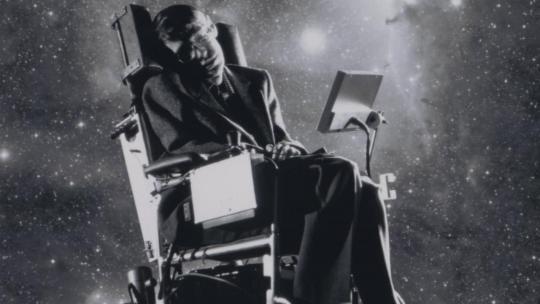
View On WordPress
0 notes